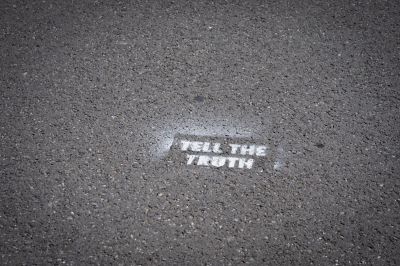Truth is never relative

Now over a hundred days and counting, Putin’s appalling invasion of Ukraine is still not a war, only a “special military operation” — complete with troops, tanks, bombs, missiles … and many thousands dead! In the West, everybody knows it’s a war. But in Russia, with its state-controlled media and tight restrictions on social media, the callous attack on a peaceful neighbor is seen as a benign, even righteous, “operation,” saving Ukrainians from themselves.
No reasonable mind would see the Ukrainian conflict as anything other than a brutal war of aggression. How, then, can ordinary Russians be so deceived? Just as “you are what you eat,” equally true “you are what you read.” When all you can read is the party line in newspapers like Pravda (ironically meaning “truth”!), Putin’s cynical lies are the only truth you know.
Even in open societies, what one reads or hears can shape one’s perceptions narrowly. Choose your source: Fox News, CNN, CNBC, NPR — perhaps even The Christian Post. Tell me which you regularly follow, and I’ll tell you what you’re likely to believe. Or, tell me what you believe, and I might just guess your favorite channel or digital news outlet.
So, which came first: the “glasses” you’re wearing, through which you see the world; or your worldview being reflected in the kind of “glasses” you have chosen to wear? Are you believing what you’re seeing, or (surprise!) “seeing” what you already believe?
Concerned about unity among his closest disciples, Jesus prayed, “Sanctify them by the truth; your word is truth.” In the hours to follow, Pilate would ask Jesus, “What is truth?” yet still miss it. Even for believers, the truth that was meant to unite has become the truth that has caused yawning, contentious gaps in doctrines, beliefs, and biblical understanding. As Samuel Stone’s hymn reminds us, “By schisms rent asunder; by heresies distressed.”
Given the challenge of discerning for our time the meaning and application of an ancient Truth-text, one dare not lightly claim an exclusive understanding of Scripture. Attempting proper biblical interpretation is hard work! But one would be wise to view with caution either time-honored tradition or contemporary scholarship, both being capable of filtering divine revelation through biased, human lenses rather than allowing the inspired text to speak for itself.
Whereas theological wars have often sparked political and cultural wars, today’s culture wars are inciting theological wars. Does Scripture still speak authoritatively to today’s cultural issues, such as homosexuality and gender roles; or are today’s cultural norms driving self-affirming contemporary interpretations? Relying on either unquestioned tradition or fashionable, culture-driven theology risks a faith based on propaganda rather than truth.
If we can easily see the lie in Putin’s “non-war,” and the distorted, blind belief of so many Russian people, how can we be sure that we, ourselves, are not being deceived? Perhaps by our own government. Or by an increasingly politicized media. Or by cleverly inventive theologians who are reading into Scripture what they want to get out of it. Worse yet, maybe even by our own self-deception, believing and seeing what we desperately want to believe and see.
In a cynical world imitating the Father of Lies, we can’t always know what lies we are blind to. Our best chance of knowing the real truth — the truth that will set us free — is starting each day by reading the only Truth we can always rely on, then testing every other truth claim by that divine light.
F. LaGard Smith is a retired law school professor (principally at Pepperdine University), and is the author of some 35 books, touching on law, faith, and social issues. He is the compiler and narrator of The Daily Bible (the NIV and NLT arranged in chronological order).



























